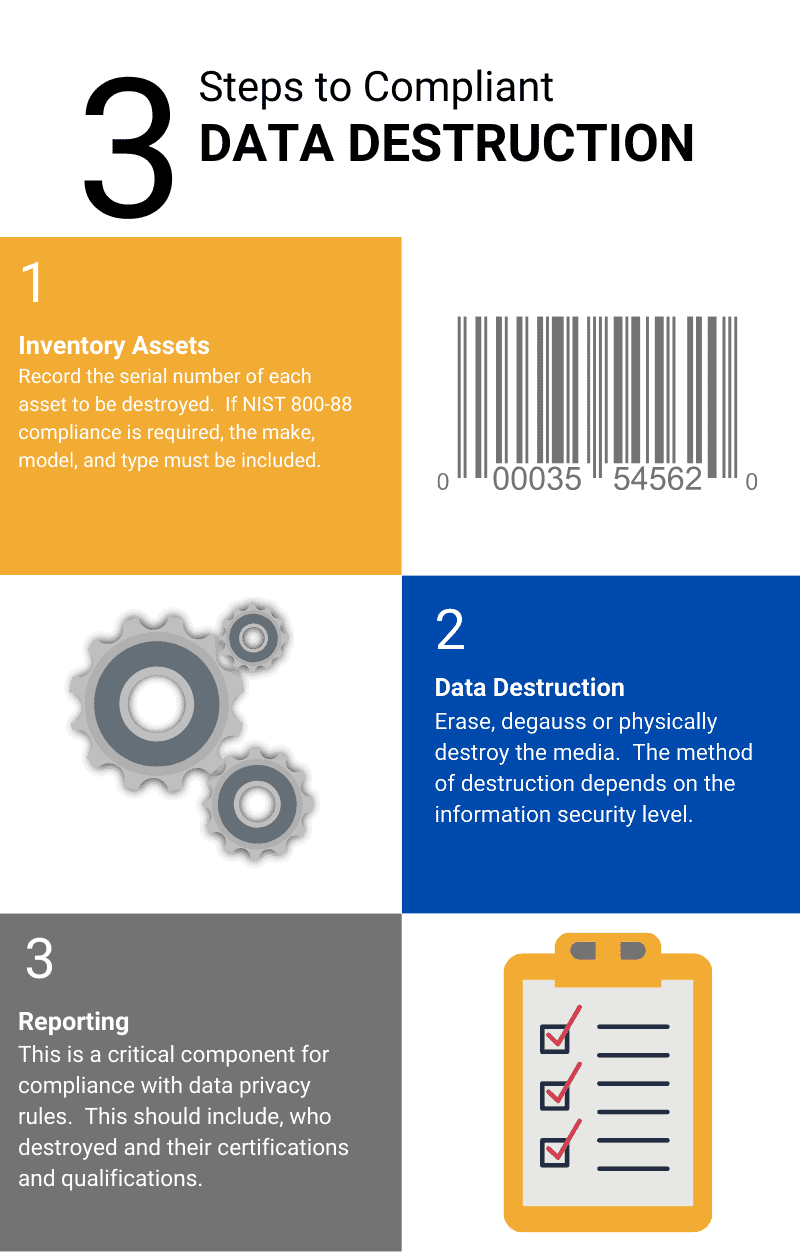Understanding the Role of Data Destruction in Strengthening Cyber Security Defenses
Understanding the Role of Data Destruction in Strengthening Cyber Security Defenses
Blog Article
The Significance of Effective Data Damage Practices in Shielding Sensitive Info and Ensuring Computer System Security
In an age where data breaches are progressively common, the importance of reliable information devastation methods can not be overstated. Carrying out durable information damage methods not just alleviates these dangers but also straightens with legal compliance needs, making sure that organizations promote their track record and foster client count on.
Understanding Information Devastation
Recognizing data devastation is critical in today's electronic landscape, where sensitive details can quickly be compromised. Reliable data destruction entails not simply erasing files yet guaranteeing that information is irretrievable through thorough techniques. This procedure is vital for organizations that manage confidential customer information, intellectual home, or internal papers, as any violation can lead to severe financial and reputational repercussions.
Information destruction includes various methods, consisting of shredding physical media, degaussing magnetic storage gadgets, and using software-based solutions that overwrite data numerous times. Each method serves a details function and has to align with the level of sensitivity of the details being thrown away. For instance, physical destruction is usually chosen for difficult drives containing highly private data, while software program methods might be sufficient for much less sensitive info.
Moreover, adhering to market criteria and laws, such as the General Information Protection Law (GDPR) or the Health Insurance Coverage Transportability and Liability Act (HIPAA), is important for compliance and to alleviate lawful dangers. Organizations needs to create a robust data damage policy, train staff members on best methods, and frequently audit their procedures to ensure that all delicate information is thrown away safely and properly.
Risks of Inadequate Practices
Insufficient data destruction practices reveal organizations to significant threats that can have far-ranging repercussions. When sensitive information is not properly dealt with, it continues to be at risk to unauthorized access, which can bring about data breaches and identity burglary. Such occurrences not just jeopardize the security of people however likewise taint the company's reputation, causing a loss of customer trust and prospective monetary consequences.
Additionally, regulative conformity is progressively strict in several industries. Failing to stick to data damage laws can result in substantial fines and lawsuits against organizations. These charges can divert and stress economic resources attention from core company operations.
Additionally, the misuse of recurring data can cause copyright theft or company espionage, threatening competitive advantages (data destruction). The influence of poor data damage expands past immediate monetary losses; it can additionally lead to long-lasting damages to brand name integrity and market position

Organizations have to recognize that data security is not entirely concerning stopping breaches; it additionally includes the accountable administration of data throughout its lifecycle. Ignoring reliable data damage procedures can have catastrophic effects, highlighting the necessity for durable steps to mitigate these risks.
Ideal Practices for Data Damage
Carrying out efficient data devastation methods is important for protecting sensitive info and maintaining compliance with governing requirements. Organizations must adopt a multi-faceted approach to ensure that information is irretrievable, thus preventing unapproved accessibility and potential violations.
First, information ought to be categorized based on sensitivity, permitting organizations to apply ideal devastation methods customized to the degree of risk. For digital data, making use of software-based data-wiping devices that abide by sector standards can efficiently overwrite existing data. Physical damage methods, such as shredding or degaussing, are crucial for devices that store delicate information, making certain complete eradication.
Establishing a clear data retention plan is vital, outlining how long various kinds of information must be preserved prior to devastation. Routine audits of data storage systems are additionally essential to identify unneeded or outdated data requiring elimination.
Moreover, training workers on the relevance of information devastation and the details procedures to adhere to fosters a culture of safety within the organization. Ultimately, keeping paperwork of data devastation refines provides liability and sustains compliance with interior plans and exterior regulations. By sticking to these finest techniques, companies can significantly minimize the risks connected with data exposure.
Legal and Conformity Factors To Consider

Failing to abide with these laws can lead to extreme charges, including considerable penalties and reputational damages. Organizations has to implement a robust information damage plan that straightens with these lawful structures and provides clear standards on the proper methods of click for more data disposal, whether physical shredding or electronic wiping.
Moreover, maintaining documents of information devastation tasks is crucial for showing conformity during audits or evaluations. By prioritizing lawful and conformity considerations, organizations can enhance their data security stance and foster depend on with customers and stakeholders, eventually contributing to an extra safe information management atmosphere.
Advantages of Effective Data Devastation
Efficient data devastation methods expand past simple compliance; they provide considerable advantages to organizations that prioritize them. By ensuring that sensitive information is irretrievably destroyed, companies mitigate the threat of information violations and the possible economic consequences connected with them. This proactive approach not just safeguards versus unapproved gain access to yet likewise improves the overall reliability of the company in the eyes of stakeholders and clients.
Implementing durable data damage methods, such as physical damage of storage space devices or innovative data cleaning methods, adds to the strengthening of an organization's cybersecurity stance. data destruction. It lowers the chance of copyright theft and safeguards exclusive information, therefore keeping a competitive edge in the market

Final Thought
To conclude, effective data devastation practices are necessary for safeguarding sensitive information and improving general computer system safety and security. By executing comprehensive methods such as shredding, degaussing, and software overwriting, companies can minimize the threats connected with unauthorized accessibility and data violations. Adherence to regulative criteria, including GDPR and HIPAA, more reinforces conformity and safeguards against lawful effects. Inevitably, a dedication to robust data damage techniques cultivates a culture of responsibility, therefore strengthening a company's cybersecurity position and maintaining client trust.

Report this page